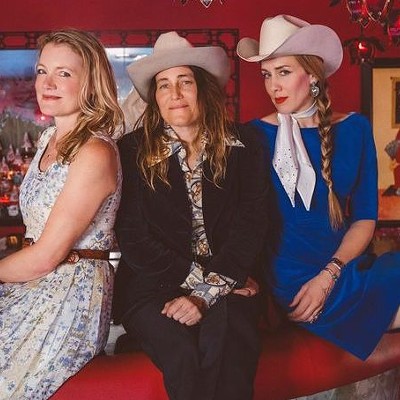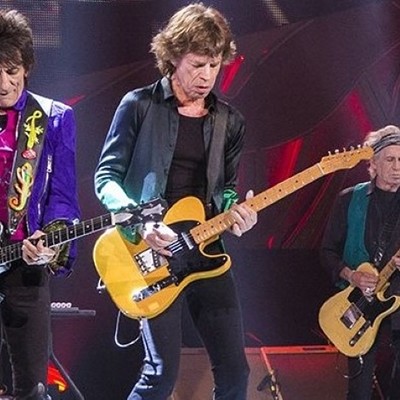Texas supergroup the Flatlanders (although it still exists) may have been "more legend than a band" but the same could also be said for the Flying Burrito Brothers (above, with female friends). The pioneers of country-rock were a short-lived act that went though numerous lineup changes, but records like The Gilded Palace of Sin and Last of the Red Hot Burritos are consistently cited by alt-country/No Depression/Americana acolytes as sonic holy grails.
However, the band and its story have been overshadowed by the live-fast-die-young/corpse-burning story of co-founder Gram Parsons. Like Hendrix, Joplin and Morrison before him, the doe-eyed Georgian (in all his marijuana-decorated-Nudie-suit glory) has become larger in death than he ever could be in life.
Rock journalist and radio host John Einarson, who has penned books on Neil Young, Randy Bachman, Buffalo Springfield and Gene Clark, wanted to set the record straight. He collaborated with Burrito co-founder Chris Hillman on this, the most comprehensive ever look at the story and music of the band. Rocks Off spoke with the Canadian scribe during a break in his current project, a biography on Love leader Arthur Lee, about Burritos myth, reality, and "Grampires."
Rocks Off: You have Chris Hillman (right) listed as a co-author, but it's not his autobiography.
John Einarson: The credit reads "John Einarson with Chris Hillman," which implies that Chris wasn't a co-author, but the key contributor. When I made the decision that I wanted to tackle the Flying Burrito Brothers story, I first contacted Chris seeking his support and cooperation. I knew that if this new book was going to tell the real behind-the-scenes story of the band, I needed Chris since it's really about him. He was the co-founder, leader and driving force in that band.
RO: One of the book's main themes is throwing the cold water of reality on the mystique of Gram Parsons. How difficult is it to counter a myth that is so entrenched?
JE: Very difficult. That's what the purpose of the introductory chapter addresses, namely how myth and legend have obscured the true story of the Burritos and how the roles of the other members, especially Hillman, have receded to the point of almost being footnotes to the larger-than-life Gram Parsons mystique. It wasn't that way.
But die-hard Parsons fans are very set in their ways and love their man unequivocally. The book does not set out to diminish Gram's contributions to the Burritos - in fact, Chris acknowledges Gram's contributions and strengths and the very close, almost fraternal, relationship they enjoyed initially.
We knew going in to the project that the book would divide Burritos fans - the Grampires from the rest - but also knew that the mythology was getting way out of proportion.
Flying Burrito Brothers, "Christine's Tune (Devil in Disguise)"
RO: Chris, by everything I've read or seen, was a kind of shy, unassertive guy. Was this his chance to really come clean?
JE: Yes. What he has had to endure since Gram died is the increasing falsehoods and exaggerations told as fact. The unknowing Parsons fan who Googles his name is going to come away with the impression that Gram singlehandedly gave birth to country-rock as the lone visionary leading everyone else through the wilderness backed by a band assembled by him as a faceless backing group with the curious name Flying Burrito Brothers. And that Parsons conceived the group, wrote the songs, arranged them and was the visionary and shining star.
Nice story; not true. In the last year or two, with the release of that live Burritos 1969 CD [Gram Parsons with the Flying Burrito Brothers: Live at the Avalon Ballroom 1969] credited largely to Gram Parsons and the two recent biographies of Parsons, Chris just felt that enough was enough. Parsons did not act alone. There are other people in this story who need to be heard, Chris especially.
RO: You indicate that steel guitarist Sneaky Pete Kleinow (right) was the real musical genius in the band, but you quote him as saying he couldn't recall a live performance that didn't "reduce him to tears." Were the hit and miss (mostly miss) live shows of the Burritos the most damaging obstacles to greater recognition?
JE: There is no doubt that the original band's inability to present a professional and compelling live show - as opposed to the later, post-Parsons Burritos who were a dynamic live attraction - hindered their progress. But besides that, the timing simply wasn't right to bring young, longhaired rock audiences to country music.
The battle lines still existed between redneck and hippie and country music. The Burritos were two or three years too early.
Flying Burrito Brothers, "Six Days on the Road"
RO: "The Burritos invented country-rock." What do you think is wrong about that statement?
JE: It's incorrect because the true country-rock, if you get right down to it, was the rockabilly of Sun Records-era Elvis, Carl Perkins, Johnny Cash, the Burnette brothers and so on from the early '50s. Rockabilly is country rock. But the country rock largely emanating from southern California in the mid to latter '60s was not "invented" by the Burritos.
Others were integrating country textures and instrumentation into a rock context either at the same time or before the Burrito Brothers. [Some of the work of] the Byrds, Buffalo Springfield (right) and Mike Nesmith was country-rock. There's also Gram Parsons' International Submarine Band, Gene Clark, Poco, Dillard & Clark, Hearts & Flowers, Linda Ronstadt, Rick Nelson, the Nitty Gritty Dirt Band, and Ian & Sylvia's Great Speckled Bird to name but a few.
Hell, listen to Buck Owens' recordings in the early '60s out of Bakersfield and they've definitely got an electrifying country rock sound to them.
RO: Even if the band could have held it together and been professional, do you think they would have enjoyed the success that eventually went to the Eagles?
JE: No. There were just too many forces working against that kind of success both within the Burritos and in the milieu they were toiling in at the time. Timing is everything, and the Eagles came along at a point when younger audiences were more receptive to country music, or at least a homogenized pop version of it as espoused by the original Eagles.
As [former Burrito and original Eagle] Bernie Leadon points out in the book, the Eagles learned from the mistakes of the Burritos and honed their craft all the way to the bank. They took the rough edges off and avoided being stereotyped as country; they made a conscious decision not to have a pedal steel in the band.
They made what others before them had been working at commercially acceptable to AM radio and a mass audience. As well, no one knew how to market country rock when the Burritos first emerged. They were marketed as a rock act to rock audiences in rock venues where audiences were generally hostile to steel guitars and hillbilly harmonies.
RO: What's your own personal favorite Burritos song?
JE: I think "Sin City" typifies the original concept of the Flying Burritos: a hip country band. They never set out to merge country and rock, nor to create Cosmic American Music (which is a really ambiguous term). That was Gram's concept after the Burritos. But I also love "Colorado" from the third album with Rick Roberts. I think that's a country-rock classic.
RO: Finally, what in your mind is the most important musical legacy or influence of the band in 2008?
JE: Once fans get past the live-fast, die-young Parsons tale and really get into the music, they discover a band of musicians equal in their dedication to creating something new out of existing elements. What people appreciate about the Burritos today is their uncompromising stance and determination to make country music acceptable to younger audiences by respecting the traditions within the genre, but with a contemporary and hip lyrical mindset. - Bob Ruggiero
Jaw Bone Press, 336 pp., $19.95






